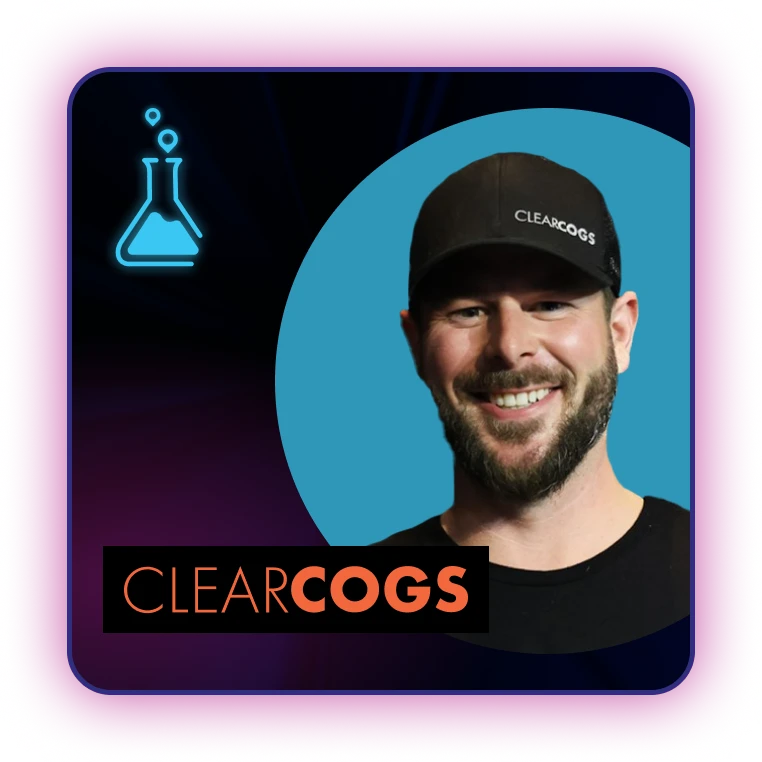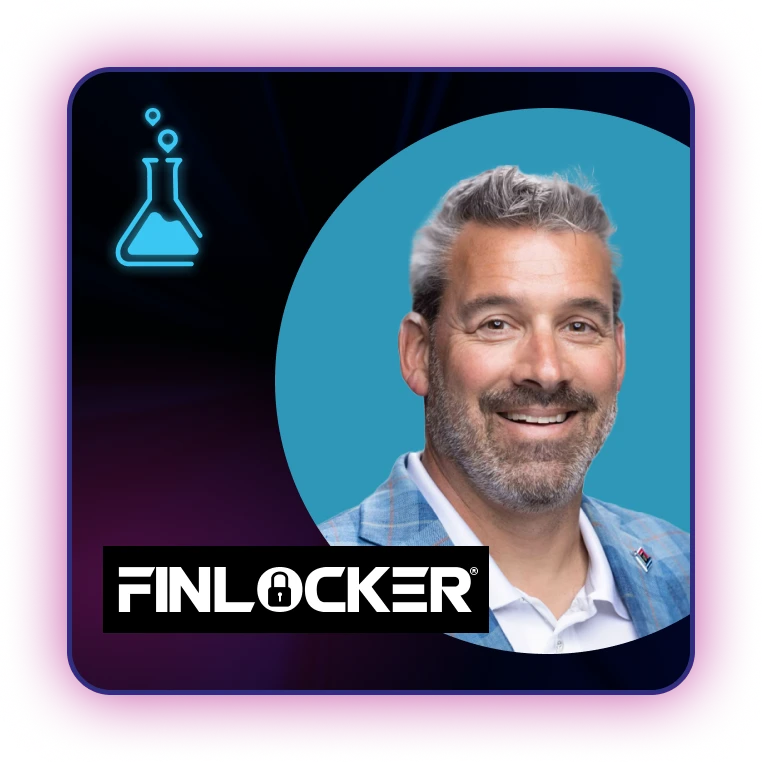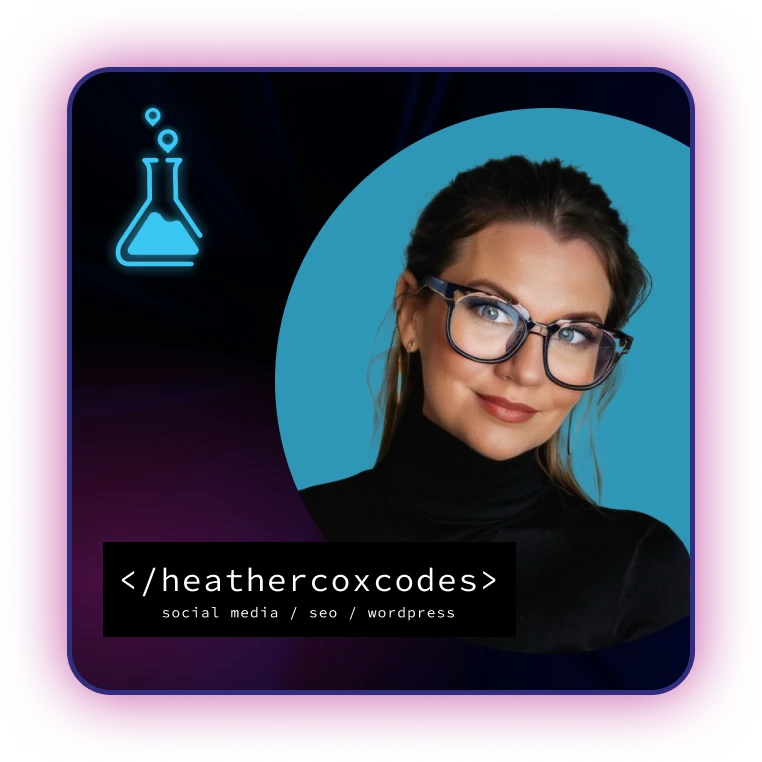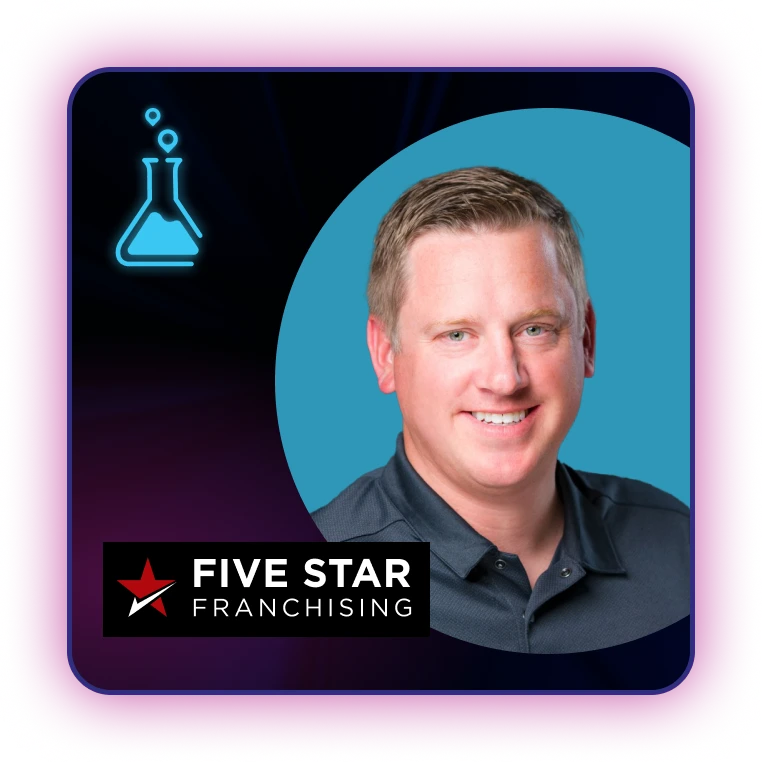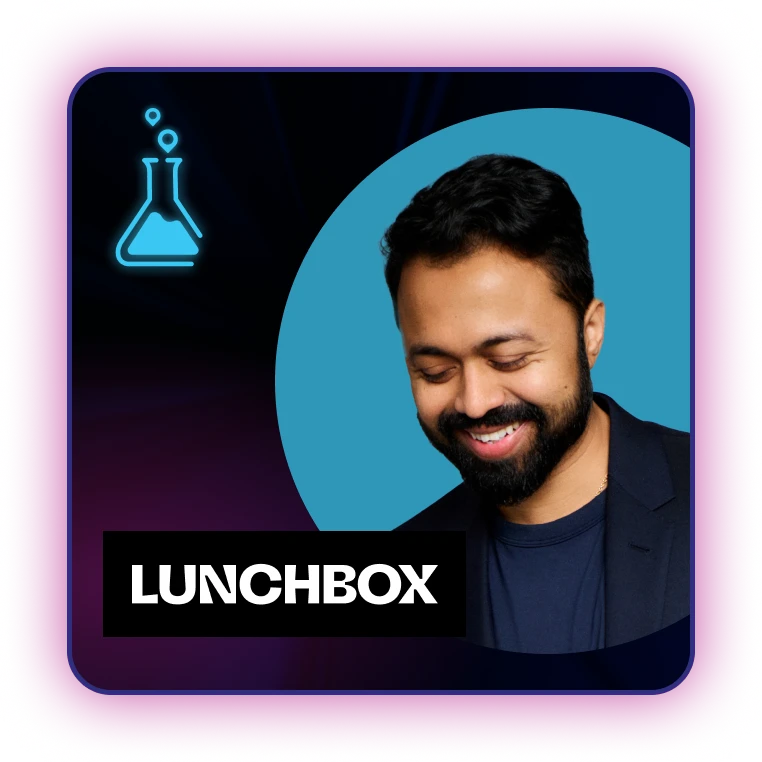< All episodes

November 22, 2023
Data-driven decisions for boosting your local marketing
with Carl Orsbourn
Co-Founder & COO of Juicer and author of the Delivering the Digital Restaurant book series
Summary
In this episode of The Local Marketing Lab, we have an illuminating discussion with Carl Orsbourn, co-founder and COO of Juicer and author of the “Delivering the Digital Restaurant” book series. With over 25 years of experience crunching data and driving optimizations for restaurants, Carl provides invaluable insights on data-driven decisions for boosting your local marketing, fostering digital hospitality, and developing thoughtful digital strategies.
Harness the power of local data. Carl stresses the importance of analyzing transactional data patterns at each individual location. Identifying trends and customer behaviors allows restaurants to tailor promotions, pricing, and marketing outreach to connect with local customers and ultimately make better data-driven decisions. Matching promotions to local events and interests is key.
Focus on digital hospitality. Respond promptly and authentically to online reviews and messages to make guests feel heard. Developing social content that highlights your teams and processes fosters community and loyalty. Quick, genuine digital engagement strengthens local bonds.
Take an incremental approach. Don’t tackle every digital initiative at once. Start by optimizing third-party marketplaces, then focus on building a direct ordering platform and loyalty program before diving deeper into customer-centric efforts. A thoughtful sequencing allows for greater impact.
Tune in to gain data-driven decisions and insights on strengthening local marketing through tailored customer engagement, digital hospitality, and strategic digital growth. Carl provides restaurant marketers a guidebook for success in today’s digital landscape.
Key Takeaways
Here are some topics discussed in the episode related to data-driven decisions:
- Analyze transaction data patterns at each location to uncover opportunities
- Optimize your Google presence for local SEO through content
- Respond quickly and authentically to online reviews and messages
- Develop social content that highlights your teams and processes
- Take an incremental approach to major digital initiatives
Being able to respond to your guests quickly, to respond within the hour of them dropping a message, is a really empowering way to make people feel heard.
CARL ORSBOURN

Resources
- Connect with Carl Orsbourn on LinkedIn.
- Learn more about Juicer and how they help with dynamic pricing.
- Check out Carl’s Digital Restaurant book series.
- Subscribe to Carl’s newsletter on LinkedIn — The Digital Restaurant.
- Listen to an episode of The Digital Restaurant podcast.
Other shout-outs
- Find a Rock and Brews burger location near you.
- Meredith Sandland — Co-author of the Digital Restaurant series.
- Connect with Troy Hooper on LinkedIn.
- Follow Shawn Walchef on LinkedIn.
- Learn more about the hype of Slutty Vegan.
Transcript
Justin Ulrich
I’m gonna get a drink of water. So nervous about this one.
What’s up everyone, and welcome to the Local Marketing Lab, where you get real-world insights from industry pros to help you drive local revenue and local for growth. This podcast is brought to you by Evocalize – digital marketing tools powered by local data that automatically work where and when your locations need it most. Learn more at evocalize.com.
What’s up, everyone? And welcome to the Local Marketing Lab. Today we have a super exciting guest with us. He has about 25 years focusing on data, crunching the numbers, and cranking out optimizations. He’s a best-selling author of the Delivering the Digital Restaurant book series. He’s a Business Insider and Nation’s Restaurant News Tech Power Player. And he is the co-founder and COO of Juicer, Carl Orsbourn. Thanks for joining us in the lab.
Carl Orsbourn
Thanks for having me, Justin. Great to be here. How are you doing today?
Justin Ulrich
Doing well, doing well. Carl, I’ve been super excited to get you into the lab. Your background’s super interesting just because you haven’t always been in the restaurant space, but you’ve always seemed to have a focus on understanding data at a local level as well as leveraging that data to make local decisions.
Carl Orsbourn
Yeah, that’s right. I mean, most of my background is in multi-unit retail, in the convenience store sector. It’s only been the last six or seven years where I’ve really been focused very much into restaurants.
But look, the reality today for any retailer, restauranteur, anyone in the space that has got customers on a frequent basis like we do, has to embrace data to be able to make better decisions. And for sure, that is true for marketing, but it’s true actually through every single function within the restaurant environment.
Justin Ulrich
So true, so true. I got to say too, before I move on, Carl, I almost wore my glasses today because I thought I’ve got to look smarter. Carl is so smart and he sounds smart. Your accent is just…
Carl Orsbourn
Only when I live in America, Justin. As soon as I go back to England, I suddenly am normal again. I love the fact that everyone thinks I’m smart over here. I try to use my accent and practice on it every single day, but trust me, it is just the accent. I really do not have anything smart about me.
Justin Ulrich
Oh, I don’t know if your whole background is in data, you’re pretty bright but in your current role, you really empower local operators to take action on their locations’ data. And so I would ask, from your experience, what do you feel is the most important aspect or maybe even the most impactful way that they can leverage their local data to influence their local marketing?
Carl Orsbourn
Yeah. Well, look, there’s so many different ways we cover this in both of our Delivering the Digital Restaurant books and how to think about using data to make better decisions, both on a national and local level.
But in my current company, Juicer, where we’re helping restaurants use their data to make more informed decisions around pricing, we’re actually trying to help us recognize that every single location has its own profile, it has its own kind of different trends.
And what I mean by that, Justin, is you could look at a particular item on a menu, and for whatever reason, on location, a doordash will see a peak of that item being sold at 06:00 p.m. For Uber Eats, it will be 08:00 p.m. And then go to a location B, maybe a couple of miles down the road, and it will be the complete opposite type of pattern.
And so a lot of those almost small and perhaps details that would otherwise be seen as insignificant actually collate out a series of really important patterns. And it’s these patterns that the data scientists in our team at Juicer are pulling together to make recommendations about different price points.
But price is almost only one part of the story here. You could think of this also from the standpoint of promotions. So how do you really think about the way in which you promote to your customers for your specific locale? What I mean by that is, well, let’s take a local event, maybe a local college game or something. To what level do different folks deploy different levels of promotions to support? I mean, the big chains out there.
For example, who was it the other day? I’m here in Southern California, and McDonald’s had this thing where when the Dodgers score six runs or more, they have a special promotion that’s triggered on their app, right? So therefore, they are local fans in their area.
So you can use both information about the specific location itself through the patterns that you see in your transactional data, like we do at Juicer, or through information about the locality in which you’re in to really help the restaurant and its guests connect together and feel like they’ve got a great pulse on what’s happening in their environment.
And I think that’s really the exciting thing about using data that’s out there, trying to find the patterns and then trying to use that to draw a closer connection to your guest.
Justin Ulrich
100%. Yeah, that’s one thing we help do, is take the data to drive promotions like you’re talking about. And what’s cool about the approach is you can actually automate a lot of those things because the data is there. It’s just a matter of how are you leveraging it to make your lives a lot easier from an operation standpoint, to increase your efficiency, to save you time so you don’t have to worry about doing certain things like creating the promotions. You could just have the systems do it all for you.
Carl Orsbourn
Yes. The automated nature of it, I think is super important because a lot of these things for (a) restaurants don’t necessarily have the time or the resources within their teams to be able to figure this stuff out. And the second part is it does require an appropriate level of magnifying glass to identify what those trends are.
One thing which isn’t so much on the local level, but at Juicer this year, we looked at Super Bowl Sunday and we looked at 1000 different restaurants across 16 different states. And we asked. Well, we didn’t ask. We scraped the information to see how many of them changed their price on Super Bowl Sunday. How many do you think changed price, Justin?
Justin Ulrich
I wouldn’t even. Maybe 5%, maybe. Low, I would think.
Carl Orsbourn
Not even one. Now, when you look at Olo’s recent data about Super Bowl Sunday, I think they said it was something like 40% increase in orders, digital orders on Super Bowl Sunday. So you’ve got that huge surgeon that’s happening on a day and across 16 different states, in a sample size of 1000 restaurants, not one restaurant changed their price.
So I think that right there just goes to show that if we could pinpoint one event, especially a sporting event of the year, where, you know, people are going to be ordering food for delivery and you’re not actually accommodating for that. Now, of course, restaurants are going to be using the data to be able to inform their inventory levels, their purchasing levels, their ability to ensure they’ve got enough team members.
But in terms of using it for the outreach, to be able to capture more guests, to be able to perhaps gain the attention of guests that wouldn’t have otherwise come to that restaurant, there’s still some opportunity out there, I think it’s fair to say.
Justin Ulrich
Yeah, that’s an incredible stat. I mean, the opportunity there of basically how much potential there was just left on the table just for making a slight adjustment. I mean, you don’t even have to increase your prices a ton to have a big impact to your business if your volume is increasing that much more.
Carl Orsbourn
Absolutely.
Justin Ulrich
Yeah. Very interesting. Have you seen some certain ways you mentioned promotions earlier? Have you seen any specific examples of how your clients are leveraging the data to take action.
Carl Orsbourn
From a promotional perspective?
Justin Ulrich
Or just from a local marketing perspective in general, whether it’s promotions or if you talked about adjusting the pricing as well, what are some things that have actually worked for some of your clients?
Carl Orsbourn
Well, I think for a lot of the folks that either we work with at Juicer or ones that I’ve come across through my work in writing the books, I think a lot of this is actually about community and engagement, quite honestly.
So one of the folks that I like to really call out these days are the ones that try to embrace the special days. Now, this last week we had, I think it was National Cheeseburger Day and National Cheeseburger Day, my wife told me about it because she found something, I think it was on Nextdoor or Facebook that the actual National Cheeseburger Day came to her attention. And then she listed out a whole range of different offers and promotions that were out there.
And look, of course the McDonald’s, the Burger Kings, the Wendy’s had certain promotions and they were quite value-driven in terms of their particular promotion. I went on and typed into Google, I said, what are the top burgers in Orange County in California I’m in? And what came up very quickly in 1st, 2nd on the listings was the top 15 burgers in the OC.
And second on the list was Rock and Brews and their burger that they were offering. And of course they had a promotion going on that day. Now this was a Monday night, Justin, and that Monday night we going to Rock and Brews. And we weren’t necessarily thinking about eating a burger that evening, but we went out and we had a nice burger, a couple of beers at Rock and Brew and it was fantastic.
And I share that with you because I wouldn’t have gone to Rock and Brew if the content wasn’t available to me to find out about the best burgers in the OC through Google. So there’s a big part of this, which I think is about optimizing your Google presence. It’s a big part of it about being able to think about SEO from the standpoint of content, so that when people are looking for good food near them, they can be found. And sometimes that’s through articles like the one I referenced.
Sometimes it’s just typing in “best burgers near me” and letting Google Maps take you there. But I think there’s a lot to be said for making sure that restaurants don’t just fall down the trap of saying, right, we need to advertise on Facebook standard promotion, or do the standard promotions that you do on an Uber Eats or DoorDash. But actually to remember that content is super important.
Justin Ulrich
Yeah. Just thinking through, where would your customers, what does their journey look like? If they’re actually hungry, what are they going to do? They’re likely going to search for the best burger near them like you’re talking about. So trying to engage with them on the channels that they are in and at the time when they’re searching, that’s what’s key from a local marketing perspective.
Very cool. No, I appreciate those examples. For our listeners out there who might be struggling to engage with their local audience or engage with their community. What are some things that you would suggest that they could do or maybe even implement today or sometime this week to start getting the ball rolling in the right direction?
Carl Orsbourn
Well, the first thing is to start, right? I mean, that’s often the toughest thing, but actually to start doing it. There’s a big part of this which is around the theme of digital hospitality that I’m sure you covered in one of your previous podcasts with the likes of Mr. Walchef and Troy no doubt.
But the reality, I think, about digital hospitality today is how do we create the equivalent of the table touch that happens in an on-premise setting. And I think there’s a big part of this which kind of comes back to the way in which your guests at a restaurant can communicate to you and being able to feel when they’re communicating to you, it’s not like it’s a letter through a carrier pigeon that only gets responded to after 21 days of travel.
Being able to respond to your guests quickly, to be able to respond to your guests within the hour of them, being able to drop a message to you, whether that be on Instagram, whether that be on a review on Google, or just in a transaction through your own website.
Being able to respond quickly and to be able to respond authentically with your voice, with what your brand represents, I think it’s a really empowering way to be able to help people feel like they’re being heard and that you care about them. And so community can often start by being able to represent your voice in as prompt a fashion as possible.
Justin Ulrich
Yeah, I really like that. The fact that you say just start. Like a lot of times folks will just think they have to come up with some big plan, and they’ve got to have a large strategy in place initially before they can do anything. And that’s kind of paralyzing. It’s just paralysis by analysis, as they say. They don’t know where to start or whatever.
Just start doing something. And then at the end of the day, you’ll find what works and what doesn’t and the things that work. Then you could find tools that help you scale effectively so that you can implement and have the technology take over those things that work and then test into other things that maybe you’re not doing yet.
Carl Orsbourn
I think that’s right. But there’s a caveat. There’s a caveat. And we try to cover this in our latest book, Meredith and I on the path to digital maturity. And that really tries to cover the fact that many restaurants today have been told just to start everything right? And it’s like to start so many different things.
And the idea of what we’re trying to cover in our latest book is to be able to say, look, this is a marathon. It’s not a sprint. It’s about understanding your priorities are for where you are right now and to try and focus your resources and your limited resources and perhaps your limited capacity, therefore, to be able to support each of these initiatives appropriately.
And we cover through this path the idea of being able to say, look, if you’re still at a point where you don’t have a first-party ordering platform and you don’t have a loyalty platform, or perhaps you don’t have a CDP or doing the great things that Evocalize do, that’s okay, but you got to start somewhere. And our recommendation is start with optimizing your third party marketplaces.
So in the example that we just mentioned, that means how do you create a closer, faster connection to the folks that are ordering through an Uber Eats or DoorDash, what are you doing to ensure that you have an ability to respond to issues as quickly as possible using the tools that exist out there?
And start to get great on that so that way you’ve got a real optimal transaction that’s happening as often as possible, where you’re getting consistent, great reviews through that platform and then move on to the next piece, perhaps having your own direct ordering channel.
It’s only into chapter six where we talk about guest centricity, where then we start to say, okay, now you have got to a place where you’ve been able to build a machine that can create a guest experience that’s very notable. Now, from the data that you’re able to collate from that, how can you create a very hospitable, guest-orientated experience that makes them want to come back and back again each time, but to your direct channel this time?
And so part of this is about the appropriate journey and the speed that folks really dedicate to each one of those areas, but not trying to do everything all at the same time.
Justin Ulrich
That’s right. Yeah. Start somewhere. Start somewhere small. Crawl, walk, run. Just get something in place and go from there. I really like the breakdown that you just offered. Do you have any examples of folks that you’ve worked with that have actually taken your advice and who have done really cool things from a local marketing standpoint?
Carl Orsbourn
Well, I don’t know whether they’ve taken my advice or not, but I mean, obviously through the books or through our podcast, The Digital Restaurant, and the various content that we put out there through LinkedIn. I’m hoping someone might have taken a tip or two, but the folks that I admire in this space, at least Justin, are right now for sure, Slutty Vegan.
Have you heard of Pinky Cole’s team as Slutty Vegan? They’re relatively small concept, I think, 12/13 units, but they have such a great spirit and identity about themselves that they create communities which really make their guests, their fans and their fans their marketeers.
And that ability to be able to drive a level of attention through a risque, somewhat edgy brand with brilliant and funny and amusing anecdotes on their packaging and their kind of call outs on social. They’ve been out to build this fight, so much so that they had, I read a mile-long line outside their latest opening in Texas, which for a twelve unit chain, you must be going, what on earth?
I’ve only heard of that kind of stuff happen before with Mr. Beast, but he has 22 million followers on you. So these type things can happen if you focus in on being clear as to who you are, who you’re not, being able to develop a social presence and a level of community that really captures people’s attention and wants to enjoy in the play of it all.
And I think if you can do that, then you’ve got some kind of connection that immediately eradicates this whole idea of third party to first party conversion, because they want to be part of you, they want to be part of your community, and they then become the heroes and champions of the voice of what your brand offers.
And I’d invite any of your listeners to go and just check out a Slutty Vegan Instagram profile or a TikTok. See the ways in which they brand to life. And it is not standard limited time. Offer new dish, new flavor, certain price point. And that’s the post. No, it’s not. It’s fans enjoying the food. It’s the cooks celebrating the process of creating the food. It’s the founder having a bit of fun.
All these things come together in a way that is very, very different from the traditional marketing mindset of what restaurants are doing ten years ago. The CMO of ten years ago is no longer relevant in today’s market. And that’s today. It’s about content, it’s about community, it’s about engagement. All these themes that we’ve been talking about.
Justin Ulrich
Yeah, and authenticity. I love that example. It seems though, they have no issue being authentic and the fact that they could put out content from so many different aspects of their business to kind of paint this big picture overall of this authentic brand, the authentic experience, the processes, everything that go into that really helps to help the local community feel like they’re part of it, feel connected. If you have someone at an ivory tower just pushing just brand stuff all day without making that connection, it’s just like everybody else.
Carl Orsbourn
Absolutely. I mean, your team are a great representation of who your clients are as well, of course. So that’s another way. Use team as a means of being able to share a voice and to share their own perspectives and for them to be champions of the brand too.
Justin Ulrich
Absolutely, man. That’s a great example. Carl, you sent me over some interesting facts about yourself. So one thing I thought, there’s a couple that are pretty cool. One was very interesting to me. I definitely want to hear more about. So you’re. You are a beach volleyball player and you run a group out of Southern California.
Carl Orsbourn
Yeah, at a very intermediate level. I don’t want any AVP challenges coming my way anytime.
Justin Ulrich
That was interesting. I also thought it was interesting you’re a huge Tottenham Hotspur soccer fan, which is respectable. But the one that really got me is that you were once hypnotized on stage at a Vegas show.
Carl Orsbourn
Yes, I was. First of all, if you’ve never been to one of these audience participation hypnosis shows, it’s interesting because they ask everyone to be able to participate if they’re interested and I’ll try and demonstrate. They ask everyone to put their fingers out and their hands out with their index fingers about an inch apart. And they ask you to focus on the space in between the fingers to be able to fill them coming closer together.
And those whose fingers came closer together after a little bit of suggestive talk, should I say, were the ones that were initially shortlisted for the purpose of being out anyway. So I ended up being one of the twelve on stage, and I was barking like a dog, doing sign language to the audience for those that were hard of hearing.
At one point, I had to jump off stage because the hypnotist suggested my owner was three rows back from the front. And I genuinely had the plans. I remember very consciously feeling like I had the view that I needed to go and jump off and jump onto her lap in the audience like a good dog would. And you could see, you could see the hypnotist thinking, “Lawsuit. Oh, my God, what are we going to do here?”
And luckily, she brought me out of it. But oh, my goodness, anytime now, someone’s going to say the magic word and I’m going to start barking again.
Justin Ulrich
Can you please let us know what the magic word is right now, publicly? That is so funny. That is hilarious. You wonder, being a bit skeptical, like, how real is this stuff? But I’ve had other friends that they’ve gone on stage, my budy’s mom too, fully hypnotized, which is kind of insane. Yeah.
Carl Orsbourn
My buddy said to me, Carl, because I was convinced I wasn’t hypnotized. And he said, Carl, you’re either the greatest actor in Hollywood or you’re hypnotized. Trust me.
Justin Ulrich
So, one thing I have to assume, Carl, you’ve seen the Matrix, correct?
Carl Orsbourn
I have, yes.
Justin Ulrich
Awesome. Well, you know, digging into your background and just seeing you lately, it feels like with other podcasts, with all the book signings, with all the event appearances, I saw you were just at FS Tech last week. I can’t help but to think, Carl, that you may actually be plugged in somewhere.
And your background also leads me to believe that maybe I’m talking to a digital version. So let me ask you this question. Are you neurally connected to the Matrix?
Carl Orsbourn
I know Kung Fu.
Justin Ulrich
So here’s.
Carl Orsbourn
Look, I think the interesting thing, Justin, I’ll tell you, because a lot of people say this a lot about me being very connected. Ultimately, it’s about listening. Right? And I encourage your listeners to think about this as well. It’s just as long as you’re open to listening and curious to learn a lot of the stories that we write about in both of our books, both Meredith and I are not, because of our great understanding of every component part of the digital tech stack in the industry.
It’s more about being curious, asking the right questions, and being able to share that in a story orientated format or a data orientated format to really help ultimately the restauranteur, the independent restaurant owner or operator in particular get a better appreciation. And so if our being tapped into the Matrix, if you want to call it that, or just being hyperconnected into the ways in which we see what’s going on in our industry and it’s helping, then you know what? Yeah, I’ll be Neo for you.
Justin Ulrich
Well, you know what? I’m glad that you said you’ll be Neo for me because I got a picture of you right here as Neo. I wanted to get a couple volleyballs coming at you and you dodging them, but I just could not get AI to understand what I was trying to get it to do.
Carl Orsbourn
That’s funny.
Justin Ulrich
Anyways, yeah, pretty close there. Well, hey, I’ll get this over to you. It’s just like an NFT without the value. So you can have that. So awesome, Carl, it was a ton of fun having you on the show, you know. If you wouldn’t mind, just real quick, let our listeners know how they can follow you.
Carl Orsbourn
Yeah, absolutely. So if you’re interested in Juicer, then head to juicerpricing.com. Obviously, we’re trying to help the industry really learn more about how pricing can support in a way that is beyond just blanket pricing.
If you’d like to learn more about me, then please head to my LinkedIn profile. I’d love to connect with you. Similarly, you can head to our website, www.deliveringthedigitalrestaurant.com, where you can learn more about our podcast, the digital restaurant, and also both of our books that are available at a discount there, too. So thanks for having me on.
Justin Ulrich
You bet. You bet. And for our listeners, make sure you follow Carl. Follow him on social. Check out his book series, Delivering the Digital Restaurant. He’s got a couple of books there and I’m sure there’s more to come correct, Carl?
Carl Orsbourn
Got to convince Meredith.
Justin Ulrich
Yeah, we’ll have to reach out to Meredith and get her to commit because from what I’ve heard are very interesting books. They’ve got a lot of great info in them. The stuff that you were just rambling off just in this episode, very insightful. So make sure you follow Carl. Also subscribe to his newsletter, The Digital Restaurant on LinkedIn. Lots of great information there as well. Carl, it’s a ton of fun having you in the lab today. Thanks for joining us.
Carl Orsbourn
Thanks, Justin. All the best.
Justin Ulrich
As always, thanks for joining us in the local marketing lab. This podcast was sponsored by Evocalize. To learn more about how Evocalize can help you grow your business, visit evocalize.com.
If you learned something from today’s episode, don’t forget to subscribe on your favorite podcast platform and follow us on LinkedIn and Facebook at evocalize. That’s Evocalize and on X at Evocalize.
And remember, keep innovating and testing new things. You’ll never know what connects with your customers best unless you try. Until next time. Thanks for listening.

Carl Orsbourn
Co-Founder & COO of Juicer and author of the Delivering the Digital Restaurant book series
Meet Carl Orsbourn
Carl Orsbourn is a seasoned data expert with a remarkable track record of over 25 years of experience in number crunching and optimization. As the best-selling author of the Delivering the Digital Restaurant book series, he has established himself as a trusted source of knowledge. Carl’s contributions have not gone unnoticed, as he has been recognized as a Tech Power player by Business Insider and Nation’s Restaurant News.
As the co-founder and COO of Juicer, Carl is on a mission to equip local operators in the restaurant industry with the tools they need to leverage their data effectively. His expertise in multi-unit retail and his passion for community engagement make him a valuable resource for anyone looking to strengthen their local connections through data-driven strategies.

Justin Ulrich
VP of Marketing at Evocalize
Meet the host
Justin is a seasoned marketing leader known for his creative expertise and innovative go-to-market strategies. With vast experience spanning both B2B and B2C landscapes, Justin has made his mark across a spectrum of industries including software, POS, restaurant, real estate, franchise, home services, telecom, and more.
Justin’s career is steeped in transformative strategies and impactful initiatives. With specialties ranging from channel marketing and brand management to demand generation, his strategic vision and execution have consistently translated into tangible results.
Empower your franchisees.
Drive real local results.
Not every franchisee on your team is a marketing pro — yet.
Let’s change that. Reach out, and we’ll show you how!







